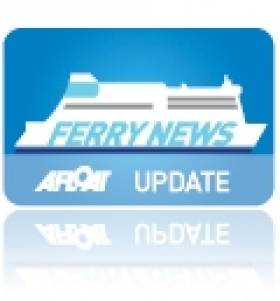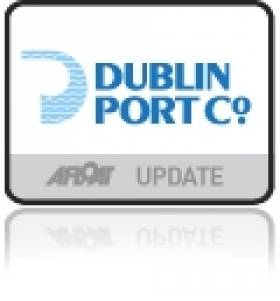Displaying items by tag: Seatruck
Seamus Leheny will join Seatruck Ferries as its new Commercial General Manager.
Leheny leaves his current role as Policy and Membership Manager for the Freight Transport Association in Northern Ireland. Prior to working for the FTA he worked for both TR and Hamilton Shipping.
Seatruck CEO Alistair Eagles said 'I have no doubt that Seamus will be an excellent addition to the Seatruck team and look forward to working with him when he commences in late summer, after completion of his notice period with the FTA'
Leheny, who lives in Belfast, will lead the commercial activity for Seatruck with Damian McGrath in Warrenpoint and Kevin Gilland in Liverpool reporting to him.
#MerseyAwards - At the Mersey Maritime Industry Awards Seatruck Ferries were named as ‘2017 Business of the Year’ during a ceremony held in Anfield, the famous venue of Liverpool Football Club, writes Jehan Ashmore.
The black tie gala dinner on Thursdays’ Mersey Maritime Awards (MMIA) was in the new Main Stand of Liverpool Football Club. The event attended by 400 people was hosted by BBC Breakfast T.V. presenter Louise Minchin.
Mersey Maritime is the representative body for the maritime sector in which there are more than 1,250 businesses based in the North West of England. The MMIA’s recognised the excellence and diversity that exists across all sectors of the maritime cluster of this region.
Seatruck CEO Alistair Eagles commented: "This is another great accolade for Seatruck Ferries, who are now the most frequent commercial shipping service on the Mersey. Our Liverpool Dublin service was the fastest growing service on the entire Irish Sea in 2016. Well done each and every one of you."
In total there were 12 winners on the night. Categories of the MMIA’s ranged from Best Newcomer to Business of the Year Award. In just under a decade of serving Liverpool-Dublin, Seatruck has gone from being the new kids on the 'lock’ to consolidating its position as the most frequent commercial shipping service on the Mersey.
The service from Liverpool’s locks (based out of Brocklebank Dock) to Dublin Port is from where Seatruck also operate a route from the Irish capital to Heysham. The UK port in Lancashire is also connected with a service to Warrenpoint. The Northern Ireland route first established Seatruck Ferries operations that began in 1996.
A network of three Seatruck routes are served by seven ro-ro freighters that carry in the majority unaccompanied freight trailers. There is limited accommodation for freight drivers in addition to private motorists, though availability on the ‘no-frill’ service is restricted.
Seatruck Adds Heysham Freight Capacity Ahead of M6 Link Opening
Irish Sea freight ferry firm is to add capacity onto its busy Heysham Dublin daily service. The 105 trailer ‘Clipper Point’ will replace the smaller ‘Clipper Ranger’ adding annual capacity of over 25,000 extra spaces. The vessel switch will take place week commencing 10 Oct.
The service upgrade for the Heysham Dublin service comes at a key point in the history of Heysham Port, just a few weeks ahead of the opening of the M6 link, on October 31, which will connect junction 34 of the M6 directly to the Port, completely bypassing the current bottleneck in Lancaster.
As well as bringing speed, schedule reliability and additional capacity, the change confirms Seatruck’s long term commitment and strategic importance to the route.
Other benefits from having the larger 105 unit vessel include, greater trailer free height and a faster turnaround time in port. The ship also benefits from a ramp interface to the lower hold instead of a lift. Drivers will appreciate the single berth cabins and the comfortable lounge area.
The larger more powerful P series vessel will join her two sister vessels which already trade from Heysham on the Seatruck route connecting Heysham with Warrenpoint in Northern Ireland. The purpose built vessel ‘Clipper Point’ is no stranger to Heysham or the Irish Sea but in recent times has been on charter to other ferry operators throughout Europe.
The deployment of larger vessel will attract more traffic to the route. Seatruck Ferries specialise in the shipment of unaccompanied freight trailers which is more efficient for the operators and makes better use of their HGV drivers which continue to be in short supply. Historically HGV freight to Ireland has predominantly moved through Scotland or Wales on a driver accompanied basis but the market is now shifting significantly.
Seatruck currently operates 3 routes on the Irish Sea offering daily connections, including a service between Liverpool and Dublin. A new weekly service linking Dublin with Bristol also commenced recently. So far during 2016 Seatruck freight volumes have grown at roughly three times the market level.
Seatruck was ‘highly commended’ in the ‘Company of the Year’ category at the recent Lloyds List Global shipping awards.
CEO of Heysham based Seatruck Ferries Alistair Eagles comments;
We have been planning for the opening of the M6 Link road for some time and it is absolutely no coincidence that we have chosen to upgrade our service offering from Heysham at this time. The Clipper Point was purpose built for Heysham by Seatruck in 2008 and we look forward to welcoming her home to help with our continued growth in the Port of Heysham.
20 years after the first Seatruck sailing we are just as hungry for growth, having just as much fun and still firmly believe that our business model is the correct one. This is just the next step in the Seatruck story.
Seatruck Add Fourth Vessel to Liverpool – Dublin Sea Route
Irish Sea freight ferry specialist Seatruck Ferries has added a fourth vessel to the Liverpool Dublin service. The ‘Clipper Ranger’ will commence operations on the week commencing 10 October, enhancing the busy midweek period with 4 departures each way per day.
The Seatruck Liverpool Dublin route, is the fastest growing freight service on the Irish Sea and the extra vessel will further improve the service offering on this key connection.
Seatruck are experiencing unprecedented demands from traditional short sea driver accompanied operators who are now looking to switch volume to the more efficient unaccompanied long sea, ‘Seatruck’ operation.
So far during 2016 Seatruck freight volumes have grown at roughly three times the market level.
Seatruck was ‘highly commended’ in the ‘Company of the Year’ category at the recent Lloyds List Global shipping awards.
CEO of Seatruck Ferries Alistair Eagles comments;
'Our growth this year on the Liverpool Dublin route has been strong but we are not resting on our laurels or sitting back. We have a firm belief in our business model, a strong team and the right infrastructure in place to take this next step. With 4 sailings each way per day Seatruck will offer an unrivalled freight only frequency between Liverpool and Dublin, allowing more operators to switch away from the traditional driver accompanied transit through Wales or Scotland'.
Seatruck to Re-Open Dublin-Heysham Route
Seatruck Ferries is to re-open the Dublin-Heysham route following the closure by DFDS Seaways of the freight-only service last month, writes Jehan Ashmore.
The first sailing of the revived route is scheduled to depart Heysham next Monday at 02.00hrs and the corresponding departure from Dublin is at 14.00hrs. Seatruck have yet to release the identity of the one-ship operated service, previously run by DFDS Anglia Seaways.
Seatruck decided to re-open the route based on strong demand and of the firm commitment to support the service from several road haulage firms.
To facilitate the additional business of the new route, Seatruck's existing use of Terminal 3 for its Dublin-Liverpool service will no longer be required. Instead all operations will be centred at Terminal 5, previously used by DFDS Seaways for their freight and passenger ferry vessels on the Heysham and Liverpool (Birkenhead) routes.
The company which is part of the Bahamas based Clipper Group Ltd (which controls 250 vessels) also operate between Warrenpoint-Heysham and Larne-Heysham. Seatruck operate an eight–strong Irish Sea fleet, which include four new vessels that were built in Spain and introduced onto two of their routes since 2008.
Lead-ship of the four 120-trailer capacity vessels, Clipper Point was followed by Clipper Panorama on the Warrenpoint route. The Clipper Pace and the final unit of the quartet, Clipper Pennant, serve on the Liverpool route. The new Dublin-Heysham route will increase the total number of all Seatruck route sailings to 80 each week.
Trade Levels Continue to Grow for Dublin Port
Dublin Port Company today published trade statistics for 2010 which showed an increase in the port's volumes of 6.1% in 2010.
Total throughput for the year was 28.1m tonnes which is less than 10% down from the port's best ever performance in 2007 at the height of the boom. Export traffic was particularly strong with 12.6% growth in the year.

Growth was concentrated in the unitised modes but was partially offset by declines in bulk liquid and bulk solid cargoes due directly to the sluggish performance of the economy.
The volume of Ro-Ro freight units increased by 12.8% to 725,665 which is less than 1% down from the port's highest ever throughput. This performance confirms Dublin Port as the island's premier port for Ro-Ro. Growth in the year was driven in part by the new CLdN Ro-Ro services to Zeebrugge and Rotterdam.
Growth in Lo-Lo container volumes was 1.1% with an outturn of 554,259 TEU in 2010.
Dublin's position as the island's largest unitised port was reinforced by the commencement of rail freight services linking Dublin to Ballina. Demand for these services continues to grow and during 2011, we expect rail freight to remove up to 10,000 trucks from the road.
Further underpinning Dublin Port's popularity among RoRo shipping lines was the decision by Seatruck Ferries yesterday to announce a new freight- only service linking Dublin with Heysham which will commence Monday 14 Feb 2011.
Imports of fuel oil products (motor fuel and aviation spirit) dropped 6.5% in the year to 3.8m tonnes. Notwithstanding this decline, Dublin Port remains the country's most important port for oil imports, accounting for more than 50% of national demand.
In the bulk solid mode, there was a 7.9% decline to 1.5m tonnes in the year due to the continued decline in demand for construction materials. Trade cars imported through Dublin Port doubled to 47,249 in the year and there was also a strong performance in the ferry passenger business with numbers up 17.6% to 1.8m.

In addition to the ferry business, Dublin Port remained the country's largest port for cruise ship visits with 85 cruise ship calls bringing 130,000 tourists and crew to the city during the year.
Discussing Dublin Port Company's outlook for trade levels in 2011, Eamonn O'Reilly, Chief Executive of Dublin Port Company, said:
"2010 was an exceptional year for Dublin Port. Notwithstanding the poor performance of the economy, port volumes grew by 6.1% as importers and exporters sought to minimise the cost of moving goods to market. Passenger and tourism volumes were also very buoyant as the benefits and reliability of ferry travel became clear particularly during the ash-cloud crisis.
"For 2011, we are projecting continued growth, albeit at a reduced level compared to 2010."Dublin Port's success is due to its location at the centre of the largest concentration of population on the island and also to the exceptional connections to the national road and rail networks. Dublin is close to the main markets, and shipping services are available from a wide range of excellent ferry and container lines offering importers and exporters competitive and reliable routes to market. We are very conscious of the central role Dublin Port plays in facilitating merchandise trade, the value of which is in excess of 80% of Ireland's GDP, and we are committed to continuing to develop the port in line with the needs of the economy and funded from our own resources."
Dublin Port Company's Annual Report for 2010 will be published later in the year.





























































